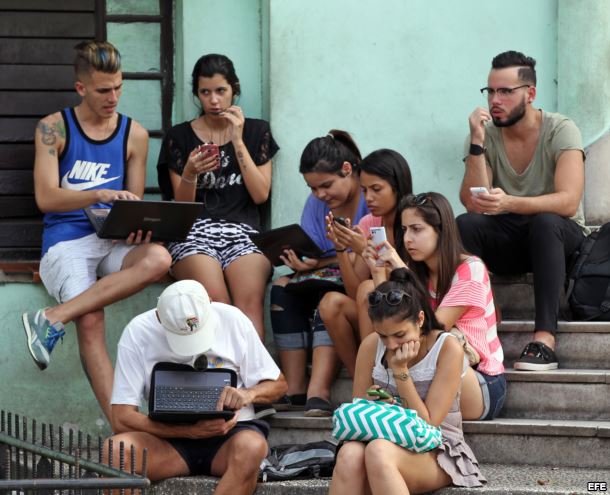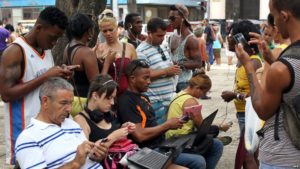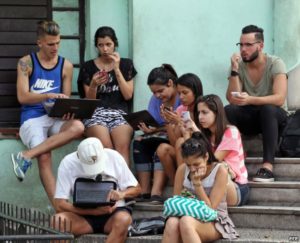![]() CUBA & INTERNET: THE GOVERNMENT PUTS THE FEAR OF LOSING POWER TO THE COUNTRY’S DEVELOPMENT.
CUBA & INTERNET: THE GOVERNMENT PUTS THE FEAR OF LOSING POWER TO THE COUNTRY’S DEVELOPMENT.
For U.S. companies to provide Cuba’s full internet access is now a dream of smoke.
Bloomberg BNA, a subsidiary corporation specializing in Bloomberg L P business, focuses on a recent analysis targeting businessmen in the dilemma of the interest that has aroused the Cuba to advise post 17-D ─ with an almost untouched market ─ in technology and U.S. telecommunications companies, and the impossible displayed their projects due to suspicions of Havana to us of the sector companies.
Points out that, on the one hand, an optimal Internet connectivity is vital to achieve the goals declared to another level of their systems of education, public health and transport however the fear of losing power make him seek new excuses every day before the possibilities of American companies begin to invest considerable amounts. The authoritarian Cuban Government maintains strict control over its communications infrastructure through the Ministry of the industry and the State monopoly Empresa de Telecomunicaciones de Cuba S.A. (ETECSA) and they believe would be a shaky grounds that slide to fall under the domain of USA
Even so, dozens of groups of that industry in the United States continue lobbying Congress to increase the bilateral agreements in trade and business. These include the Association of electronic transactions (ETA), whose members include the major players in the financial technology industry, from banks and companies of payments through cellphone to technology giants such as Amazon Inc., Apple Inc., Alphabet, headquarters of Google Inc., and Hewlett Packard Enterprise Co.
The Internet is an essential component to open the door to American investment in the industry of financial technology, which in turn supports many other sectors. “To accept credit and debit cards, retailers need to have Internet access, and it must be access fast and secure,” he told Bloomberg BNA Scott Talbott, Senior Vice President of ETA to Government Affairs.
James Williams, President of the Coalition anti-embargo “Engage Cuba” the Cuban Government applauds what it has done so far in this field, but it says that it is not enough to encourage international companies to build offices, plants and technology centers, and biotechnology or other facilities that operate Internet-based systems. Telecommunications, says, will play a key role in the sustained development of the island and its ability to attract significant investments of global companies.
He explains that international trade today is impossible without the internet. “I don’t know how they can do to grow its economy, how Cuba will become a leading country ─y think that it could be an economic engine of the first order in the Caribe─ while it continues to be disconnected from the Internet”, questioned Williams
Cuban towards United States distrust
Agreements like the one signed with Starwood Hotels & Resorts to manage hotels in Cuba, and which would give home to scheduled regular flights from major commercial airlines of USA indicate that the Cuban Government is willing to allow U.S. companies to operate in certain areas only.
The reluctance seems to emanate from the mistrust between the two Nations that has its roots in the cold war and the semiderretido, but existing, however commercial USA, as well as the approach of the Cuban Government, which sees communications as a matter of national security, rather than a tool for economic development.
A Virgin market of more than 11 million people, in the vicinity of the United States, requiring countless improvements in infrastructure and networks, could be a large volume of investments, said several sources to Bloomberg BNA. Better infrastructure may generate an increased demand among consumers hungry for mobile devices. Taking into account the population of Cuba and the penetration of lower-level devices, it could mean a market potential for millions of advanced units.
The reality that is needed for the growth of the Cuban economy is to expand the infrastructure (either wired or wireless) broadband Internet.
“The idea that they will install wireless 3G is ridiculous. They are committed to develop something that I already had in my house 20 years ago”, criticized Press, the expert from the California State University.
Meanwhile, the population of Cuba is eager to connect with their families abroad and keep in touch with the world.
Connectivity.
The Cuban authorities have insisted that the United States should lift the embargo to continue negotiating with U.S. telecommunications companies, but Press considered that this demand could be a smokescreen to avoid discussions about government control of freedom of expression and other policies.
“When removed the embargo, then ask the return of Guantanamo”, suspected Press.
The note says that if the Government gives the green light “the stage is set for an increase in economic growth in Cuba”. And according to Bill Belt, senior director of technology and standards of the Association of consumer technologies, “the Cuban authorities should think big about how to connect their people to the world”, because it “is time to Cuba make bold moves”.
Those efforts would benefit U.S. companies and the Cuban population in the sectors chosen for national development, including the care of health, agriculture, energy and learning Mobile, accurate article.
Looking to the future, Bloomberg BNA expects that, with new administrations in the United States and Cuba (where bet that Raúl Castro leave power in 2018 and the poor health of Fidel Castro, to meet 90) the “telecommunications in Cuba policy will change under new leadership, a vision of long term”.
At the moment the only likely activity is that Cuba identifies a project priority and U.S. grant to the chosen company the license to implement it.
“When the political will and the interests are line, believe that things can happen”, noted executive officials to media.
Agencies/MartiNews/Internet Photos/Excerpts/Arnoldo Varona/TheCubanHistory.com
THE CUBAN HISTORY, HOLLYWOOD.
![]() CUBA Y EL INTERNET: EL GOBIERNO ANTEPONE EL MIEDO DE PERDER PODER AL DESARROLLO DEL PAÍS.
CUBA Y EL INTERNET: EL GOBIERNO ANTEPONE EL MIEDO DE PERDER PODER AL DESARROLLO DEL PAÍS.
Para compañías de EE.UU. dotar a Cuba de plena conexión a internet es por ahora un sueño de humo.
Bloomberg BNA, una subsidiaria, de la corporación especializada en negocios Bloomberg L P, se enfoca en un reciente análisis dirigido a asesorar a hombres de negocios en el dilema del interés que ha despertado la Cuba post 17-D ─ con un mercado casi virgen ─ en las empresas de tecnología y telecomunicaciones de EE.UU., y lo irrealizables que se muestran sus proyectos debido a los recelos de La Habana hacia las compañías estadounidenses del sector.
Señala que, por un lado, una óptima conectividad a Internet es vital para lograr las metas declaradas de llevar a otro nivel sus sistemas de educación, salud pública y transporte sin embargo el miedo a perder el poder lo hacen buscar cada dia nuevas excusas ante las posibilidades de que las compañías norteamericanas comienzen a invertir cantidades considerables. El autoritario gobierno cubano mantiene un estricto control sobre su infraestructura de comunicaciones a través del ministerio del ramo y el monopolio estatal Empresa de Telecomunicaciones de Cuba SA (ETECSA) y creen sería un terreno movedizo por el que resbalarían hasta caer bajo el dominio de EE.UU.
Aún así, decenas de grupos de esa industria en Estados Unidos continúan cabildeando con el Congreso para incrementar los acuerdos bilaterales en materia de comercio y negocios. Entre ellos se cuentan la Asociación de Transacciones Electrónicas (ETA), cuyos miembros incluyen a los principales actores de la industria de la tecnología financiera, desde bancos y compañías de pagos a través del teléfono móvil hasta gigantes tecnológicos como Amazon Inc., Apple Inc., Alphabet, casa matriz de Google Inc., y Hewlett Packard Enterprise Co.
La Internet es un componente esencial para abrir la puerta a la inversión estadounidense en la industria de la tecnología financiera, que a su vez respalda a muchos otros sectores. “Para aceptar tarjetas de crédito y débito, los comerciantes necesitan tener acceso a Internet, y tiene que ser un acceso rápido y seguro”, dijo a Bloomberg BNA Scott Talbott, vicepresidente primero de ETA para asuntos de gobierno.
James Williams, presidente de la coalición anti-embargo “Engage Cuba” aplaude lo que el gobierno cubano ha hecho hasta ahora en este campo, pero dice que no es suficiente para motivar a las empresas internacionales a construir oficinas, plantas, centros tecnológicos, y biotecnológicos u otras instalaciones que operan con sistemas basados en Internet. Las telecomunicaciones, dice, desempeñarán un papel clave en el desarrollo sostenido de la isla y su capacidad para atraer importantes inversiones de empresas globales.
Explica que el comercio internacional hoy es imposible sin internet. “No sé cómo pueden hacer que crezca su economía, cómo Cuba se convertirá en un país líder ─y pensamos que podría ser un motor económico de primer orden en el Caribe─ mientras continúe desconectada de la Internet”, se cuestiona Williams
La desconfianza cubana hacia Estados Unidos
Acuerdos como los firmados con Starwood Hotels & Resorts para administrar hoteles en Cuba, y los que darían inicio a vuelos regulares programados de grandes aerolíneas comerciales de EE.UU. indican que el gobierno cubano está dispuesto a permitir que empresas estadounidenses operen en solo ciertas áreas.
La reticencia parece emanar de la desconfianza entre las dos naciones que tiene sus raíces en la Guerra Fría y el semiderretido, pero vigente, embargo comercial de EE.UU., así como del enfoque del gobierno cubano que concibe las redes de comunicaciones como un asunto de seguridad nacional, en lugar de una herramienta para el desarrollo económico.
Un mercado virgen de más de 11 millones de personas, en las proximidades de los EE.UU., que requiere incontables mejoras en la infraestructura y las redes, podría ser objeto de un gran volumen de inversiones, señalaron varias fuentes a Bloomberg BNA. Una mejor infraestructura podría generar una mayor demanda entre consumidores hambrientos de dispositivos móviles. Teniendo en cuenta la población de Cuba y la penetración de dispositivos de menor nivel, podría significar un mercado potencial para millones de unidades avanzadas.
La realidad lo que se necesita para el crecimiento de la economía cubana es ampliar la infraestructura (ya sea por cable o inalámbrica) de internet de banda ancha.
“La idea de que van a instalar inalámbrica 3G es ridícula. Están apostando por desarrollar algo que ya yo tenía en mi casa hace 20 años”, criticó Press, el experto de la Universidad Estatal de California.
Mientras tanto, la población de Cuba está ávida de conectarse con sus familias en el extranjero y estar en contacto con el mundo.
Conectividad.
Las autoridades cubanas han insistido en que los EE.UU. deben levantar el embargo para seguir negociando con las compañías de telecomunicaciones estadounidenses, pero Press considera que esta demanda podría ser una cortina de humo para evitar las discusiones sobre el control gubernamental de la libertad de expresión y otras políticas.
“Cuando hayan quitado el embargo, entonces pedirán la devolución de Guantánamo”, sospecha Press.
La nota afirma que si el gobierno da luz verde “el escenario está preparado para un aumento en el crecimiento económico de Cuba”. Y según Bill Belt, director senior de Tecnología y Normas de la Asociación de Tecnologías de Consumo, “las autoridades cubanas deben pensar en grande acerca de cómo conectar a su gente con el mundo”, pues ya “es hora para Cuba de hacer movimientos audaces”.
Esos esfuerzos beneficiarían a las compañías estadounidenses y a la población cubana en los sectores elegidos para el desarrollo nacional, incluyendo el cuidado de la salud, la agricultura, la energía y el aprendizaje móvil, precisa el artículo.
Mirando al futuro, Bloomberg BNA espera que, con nuevas administraciones en EEUU y Cuba (donde apuestan a que Raúl Castro deje el poder en 2018 y a la mala salud de Fidel Castro, a punto de cumplir 90) las “políticas de telecomunicaciones en Cuba cambien, bajo un nuevo liderazgo, a una visión de largo plazo”.
Por el momento la única actividad probable es que Cuba identifique un proyecto como prioridad y EEUU conceda a la empresa escogida la licencia para implementarlo.
“Cuando la voluntad política y los intereses se alínien, creo que las cosas pueden suceder”, señalaron funcionarios ejecutivos ante medios de prensa.
Agencias/MartiNews/Internet Photos/Extractos/Arnoldo Varona/TheCubanHistory.com
THE CUBAN HISTORY, HOLLYWOOD.










